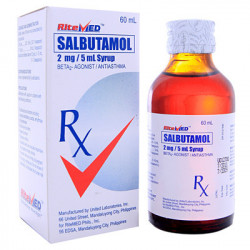Volmax CR (salbutamol) Coupons, Discounts & Cost
Volmax CR (salbutamol) is a bronchodilator. One way to save money on the Volmax CR retail cost regardless of income and insurance status is to use Volmax CR coupons or discount cards from RXCoupons. Use this Salbutamol coupon at this online pharmacy and receive up to 75% off the sale price.
What is Volmax CR?
Volmax CR (salbutamol) is a bronchodilator that is used to treat diseases associated with reversible airway obstruction (bronchial asthma, nocturnal asthma, chronic bronchitis, emphysema). Salbutamol also helps prevent premature birth.
Salbutamol is a substance with bronchodilator and tocolytic effect. It works in the smooth muscles of the bronchi and stimulates the secretion of mucus. Salbutamol is excreted mostly unchanged with urine and bile.
Volmax CR main contraindications
There are no absolute contraindications. However, do not take this drug in the following cases: hypersensitivity, arterial hypertension, rhythm disturbances, heart failure, diabetes mellitus, hyperthyroidism, pheochromocytoma, impaired renal function, I trimester of pregnancy.
What side effects may Volmax CR cause?
The following side effects are known: dizziness, headache, tachycardia (during pregnancy - in the mother and fetus), arrhythmia, hypotension, myocardial ischemia, heart failure, cardiomyopathy, pulmonary edema (with fatal outcome), agitation, tremor, nausea, vomiting, loss of appetite, difficulty with urination, sweating, hypokalemia, allergic reactions in the form of erythema, edema of the face, shortness of breath.
CNS: tremor, anxiety, increased excitability, dizziness, headache, sleep disturbance, short-term convulsions.
Cardiovascular system and blood: palpitation, tachycardia (during pregnancy - in the mother and fetus), arrhythmia, peripheral artery disease, myocardial ischemia, heart failure, cardiomyopathy.
Digestive tract: nausea, vomiting, dryness or irritation in the mouth or throat, loss of appetite.
Other reactions: bronchospasm (caused by hypersensitivity to salbutamol), pharyngitis, difficulty with urination, excessive sweating, hypokalemia (dose-dependent), allergic reactions, edema, shortness of breath.
Volmax CR overdose
Symptoms: tachycardia, low blood pressure, increased cardiac output, hypoxemia, acidosis, hypokalemia, hyperglycemia, muscle tremor, headache, agitation, hallucinations and other psychotic disorders.
Treatment: withdrawal of the drug and symptomatic therapy. Patients with bronchial asthma should be monitored carefully (high risk of severe bronchospasm).
How should I use the drug?
Salbutamol is used as a bronchodilator (it helps enlarge the lumen of the bronchi) in adults and children. The dose of the drug depends on the dosage form. The tablets are swallowed whole without chewing.
The usual dose is 2-4 mg 3-4 times a day. If necessary, the dose can be increased to 8 mg up to 4 times a day. Children aged 6-12 years should take 2 mg 3-4 times a day; 2-6 years - 1-2 mg 3 times a day or 4 mg 2 times a day.
The maximum dose is 32 mg per day (16 mg every 12 hours). The maximum dose for children of 6-12 years is 24 mg per day (12 mg every 12 hours).
What medicines should be avoided with Volmax CR?
Salbutamol enhances the effects of CNS stimulants and cardiotropic drugs.
Theophylline and ephedrine may cause toxic effects.
Corticosteroids, tricyclic antidepressants and MAO blockers increase the risk of cardiovascular complications.
Levodopa may increase the risk of severe ventricular arrhythmias.
Salbutamol reduces the effectiveness of beta-blockers (including ophthalmic drugs), antihypertensive agents, nitrates.
Volmax CR special instructions
High doses of salbutamol should be avoided (asthma attacks will become more intense). The interval between inhalations should be more than 20 minutes in case of severe attacks of suffocation. Salbutamol is contraindicated in the absence of a minimal effect of inhalation or in case of severe tremor, tachycardia, heart rhythm disturbances (it is necessary to consult a doctor). The risk of complications increases in case of long-term treatment or sharp withdrawal of the drug.

